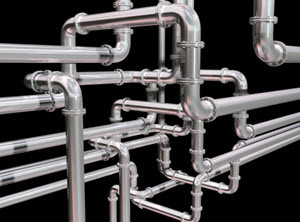 The winter of 2014-2015 was so cold that meteorologists frequently used the term “polar vortex” to describe it. At the same time, weather forecasters, residential property owners and business owners often talked about the potential damage that the unprecedented winter chill could cause. Luckily, weather experts do not project the winter of 2015-2016 to be as harsh. Nevertheless, you should prepare for the winter by insulating all accessible pipes in your home. Here are some of the best ways to insulate your pipes for winter to get you started:
The winter of 2014-2015 was so cold that meteorologists frequently used the term “polar vortex” to describe it. At the same time, weather forecasters, residential property owners and business owners often talked about the potential damage that the unprecedented winter chill could cause. Luckily, weather experts do not project the winter of 2015-2016 to be as harsh. Nevertheless, you should prepare for the winter by insulating all accessible pipes in your home. Here are some of the best ways to insulate your pipes for winter to get you started:
Outdoor Pipes
Contents [hide]
Disconnect all outdoor pipes, including garden hoses, from their outdoor water valves and shut off the water supply valves. Then, drain the pipes and store them properly. While at it, drain the water spigots accessible outdoors and plug them with faucet insulators. You can buy faucet insulators at home improvement, garden equipment, and hardware stores for a few dollars each. If you have installed frost-proof spigots, there is no need to cover them with faucet insulators.
Wall Insulation
In many residential and commercial properties, water pipes run in crawl spaces, in-between-wall spaces and attics that are prone to freezing if not properly insulated. With this in mind, carry out a thorough check to determine if the spaces where pipes run through are properly insulated. If not, you should beef up the wall insulation. According to the US Energy Department’s Office of Energy Efficiency & Renewable Energy, suitable wall insulation materials include cellulose, fiberglass, mineral wool (rock and slag wool), plastic fiber, natural fiber (straw, cotton, sheep’s wool, and hemp), polystyrene and polyurethane. However, the efficiency of any wall insulation material depends on its R-value. As such, this value should determine the type of insulation material you use.
Heating Cable
You can insulate your water pipes using heat trace cables. To do this, you can either wrap heating cables around your water pipes or attach them along the length of your pipes. Since the specific insulating technique depends on the manufacturer, you should read and follow the manufacturer’s instructions carefully. In addition, make sure you terminate and insulate all power connections to avoid electric shocks that could cause injuries or fatalities.
Space Heating
Space heating, especially indoors, could prevent pipes from freezing during the winter. In other words turning your thermostat a few notches up could prevent your pipes from freezing. Alternatively, you can place electric heaters near pipes that are likely to freeze during the cold season. However, since the latter solution could drive up your heating costs considerably, you should weigh the cost benefits of opting for space heating versus other available options such as beefing up insulation.
Pipe Insulation
This basically entails covering pipes with a relatively inexpensive insulation material such as foam-rubber pipe insulation. Nevertheless, pipe insulation alone may not be enough, particularly if your pipes are outdoors.
Conclusion
During the winter, water freezes and expands, subjecting plumbing systems to extreme pressure, which can cause water pipes to burst. The good news is you can prevent this from happening by disconnecting, draining and properly storing outdoor water pipes. Other good options include covering pipes with foam-rubber insulation, installing heating cables, beefing up wall insulation throughout your home and using space heaters.
If you have any questions on insulating your pipes, be sure to give us a call. Robinson Plumbing can assist you with any plumbing questions that you might have as well as address any of your plumbing needs. Robinson Plumbing is a local, family owned company that is known for trusted, quality service.
Call us today at (610) 351-9889 or contact us for any questions that you might have!
